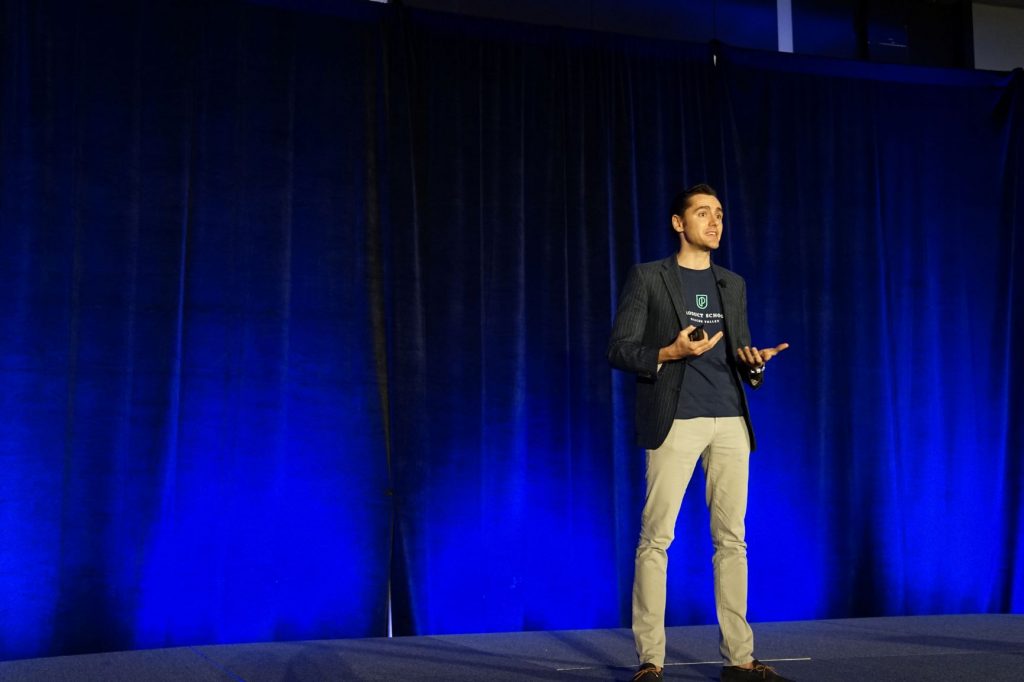In the last couple of weeks, we saw a “pros & cons” contest between in-person and online events. Each has its advantages and disadvantages, no doubt here. But instead of having a fight between in-person versus online experiences, why don’t we turn the rhetorics toward in-person and online experiences? Why don’t we embrace the hybrid events just like retail embraced the Omni-channel strategy?
“An Omni-channel retail strategy is an approach to sales and marketing that provides customers with a fully-integrated shopping experience by uniting user experiences from brick-and-mortar to mobile-browsing and everything in between”
Today we want to showcase some of the benefits of combining in-person and virtual experiences. This “alliance” is not new and over the years it evolved from a one-way broadcast to today’s engaging activity.
Going back into history, the 1939 baseball game between the Columbia Lions and Princeton Tigers was the first USA televised sports event (and one of the first in the world). Of course, it was ‘just’ a televised event, different from what we have now. But events started having both in-person and remote attendees and it was one of the first steps that brought us here today.
Going to the 70s, “The Rumble in the Jungle” and “Thrilla in Manila” were two sporting events that made history. While over 80.000 people had the privilege of attending the fights in person, over 150 Million virtual attendees watched live on a pay-per-view system. Access for the event was bought for both experiences. Yes, still far from what we now call hybrid events, but Rome wasn’t built in a day.
Today’s technology allows us to create interactive hybrid-events, where attendees do not just watch a live broadcast but are also able to interact with the hosts or to each other. They can ask questions using chat features, buy access to private rooms, or even buy merchandise straight from the stream. A lot has changed over the years, transforming what once was a unidirectional message into an engaging experience.
Let’s take a look at the main benefits of creating Hybrid Events:
Increased attendance
Hybrid events are designed to provide engaging content for two separate audiences: those attending in-person and those attending virtually. For this reason, marketers can reach beyond their typical audience and promote the event anywhere in the world. Among the various reasons for someone not being able to attend the in-person event, the main one seems to be related to distance limitations. By hosting a hybrid event, location barriers are removed, and your audience can be as diverse as possible.
As an event organizer, you might think that hosting a hybrid event will cause physical attendance to decrease. Although it might seem natural, the good news is that’s not the case at all! According to a survey conducted by Digitell, Inc., over 100 professionals shared some interesting data related to attending hybrid events. It was concluded that 83% of virtual attendees had no intention of attending the in-person event due to various limitations.
Secure your online community
Today, having an online presence for your business is a must. And with 55% of customers checking for online reviews and 47% visiting the company’s website before making a purchase, it is easy to understand why. Your event’s website and social medial platforms will help create and nurture your community, making it easy to engage your existing followers and to attract new ones. But a hybrid event will do more. It will open a new revenue stream while consolidating your connection with the online community.
For some reason, part of your online community will never attend your in-person events. But will gladly buy a ticket to access the online experience. Will ask questions, will give feedback, and purchase event merchandise. From the comfort of their homes.
This event format will tighten the bonds – the part of your community that was unable to physically attend the event can now be an integrated part of the experience.
Valuable information
As a tech company, we focused on data from Day 1. As part of hundreds of events during the last years, we saw how relevant data can increase the overall experience. This is why we always focused on creating a tool that gathers all the relevant information. We have created a system that uses NFC technology, not just for cashless payments, but for access control and engagement as well. We saw this information being used to better understand the customer journey and purchasing habits, all in order to deliver personalized, high-octane experiences. Knowing what your attendees like is the perfect (and probably the only) way to create better and better events.
More than often, the in-person experience is different from the virtual one. And what we consider to be the best parts of our events are not necessarily the most appealing ones when viewed online. This is why the online part of a hybrid event is the one that will give us a better understanding of how the content can be used in our post-event communication. A powerful tool allows virtual attendees to interact during the online stream. Viewers can mark the most inspiring moments and offer relevant feedback.
Based on this information we see what works best for in-person experiences and what people appreciate from a virtual perspective.

In-stream purchases
For the last 2 years, here at Oveit we focused on developing the closed-loop payment system that allows people to effortlessly buy the desired products. Now, given the circumstances, our focus is centered around online experiences and seamless transactions. By looking more into hybrid events and what it takes to host one, we came to the conclusion that our technology used for in-person experiences is a great fit in a virtual context as well.
Hybrid events are not just events that are streamed live to an online audience. A real hybrid event uses technology to create similar experiences and opportunities for both online audiences and live participants. In other words, online participants get to participate in the event in the same way that live attendees do.
Based on the event’s purpose and topic, participants might have the chance to purchase products or services for a discounted price during in-person events. To host a successful and authentic hybrid event, virtual attendees should have the same opportunities with in-person participants, including the ability to purchase featured products and services within the event’s venue. With Oveit, the in-stream purchase feature together with the ‘Perks, benefits, and add-ons’ feature enables virtual participants to order products in real-time within the live-streamed event. Addons are optional and they can be purchased during the registration process. On the other side, perks are usually included in the ticket price and might be offered only by purchasing a specific ticket category (e.g.: Gold Pass).
Improved ROI
Just because you decide to host a hybrid event, it doesn’t mean that online audiences are expected to pay $0 for the content you’ve prepared. Among other techniques, you can sell virtual access for a discounted price and boost your event ROI. To do that, you must assure that your audience is engaged throughout the event for a positive retention rate. As previously mentioned, it is not enough to simply broadcast your live event without providing the virtual audience with the right tools for engagement. To be able to monetize and expect paid tickets from online participants, utilize technology to provide them with similar in-person experiences.
Another way to improve the ROI for a hybrid event is to include sponsored content during sessions or other gaps. It can be any educational or event-related topic that provides value for virtual attendees and that enables sponsors to meet their marketing objectives. For example: A mobile provider might talk about the impact of smartphones on our daily lives. The topic is related to their expertise and it can educate virtual audiences while promoting its brand.
Since hybrid events are always recorded, improving ROI through captured content is another way that proves to be efficient. The available content within hybrid events tends to provide great value in return for those attending. For this reason, why not monetize recorded content and sell it after the event to attendees and others interested? One interesting finding is that free content has a low consumption rate among organizations vs. when they charge for it, meaning that viewers consider paid content to bring more value in return.
Remote speakers
A hybrid event can bring new opportunities. So why have just virtual attendees, why not virtual speakers as well? While it’s uncommon for in-person events to have virtual sessions, the offline/online format lets your creativity sparkle. Create special sessions designed for the online attendees, but allow those that are physically present to take a look – you can have a very pleasant surprise. This option will allow new collaborations, with speakers and artists from all over the world. For example, create an interactive training session for your online attendance but imagine a special environment from which in-person attendees can watch the session – some may find the information very useful. And some may want to want to use space to charge their powers – mingling can be exhausting.

Final thoughts
By focusing more on the digital side of an event, organizers can create opportunities, connect to a broader audience, increase ROI, and enable virtual attendees to feel like they almost attend in-person from all over the world. Of course, this can only be achieved by utilizing solutions that can accommodate those needs. As previously mentioned, Oveit was initially designed for mid-sized to large festivals and conferences. However, the current situation that we all deal with made us think out of the box and forced us to use our technology in a different context, that being online. For this reason, we came up with what we call Streams.live. It is a solution that enables content creators and event organizers to talk about their passions to a broad audience in real-time.
We are very positive, and we like to believe that in-person events will come back ASAP. However, people might get reluctant in the near future and might decide to stay away from large in-person gatherings. That’s why we believe that hybrid events can keep a balance and entertain large audiences from all over the world.
